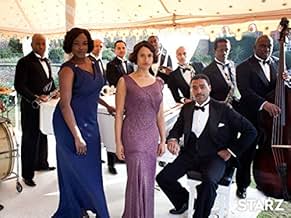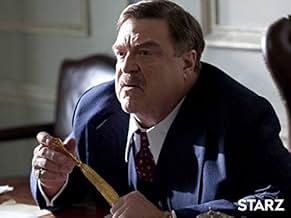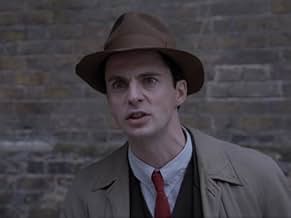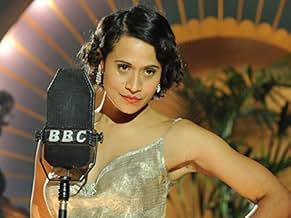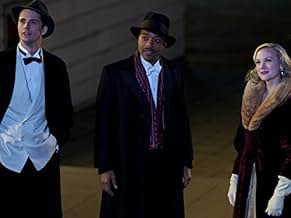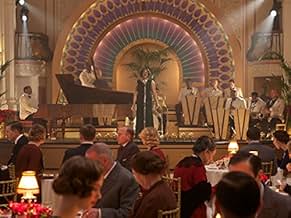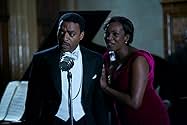Füge eine Handlung in deiner Sprache hinzuSet in the 1930s, a black Jazz band rises in fame and popularity while becoming entangled in an intricate web of intrigue, mystery and suspense with the elite of London society.Set in the 1930s, a black Jazz band rises in fame and popularity while becoming entangled in an intricate web of intrigue, mystery and suspense with the elite of London society.Set in the 1930s, a black Jazz band rises in fame and popularity while becoming entangled in an intricate web of intrigue, mystery and suspense with the elite of London society.
- Für 1 Primetime Emmy nominiert
- 5 Gewinne & 16 Nominierungen insgesamt
Folgen durchsuchen
Empfohlene Bewertungen
A clever story with enough intrigue to keep it exciting. The characters are all very interesting and their chemistry works well together.
Stanley writes and edits a local music rag and hears Louis Lester's band in a local dive. He decides to help them become successful and succeeds.
I wouldn't read the blurbs here accompanying each episode because they describe exactly what happens in that particular episode.
The production values, camera work, sets, costumes, make-up and hair are all great and authentic. There is just the right balance between the drama and the music.
They don't get too bogged down with the politics of "negro" prejudice which is refreshing. Yet we are always aware of it in the background.
My only disappointment was I felt the ending of Episode 5 was extremely rushed with a lack of the usual explanation and depth.
I assumed it was the final episode until I saw Episode 6 listed in the TV guide for tonight.
The Interview was something Stanley always wanted but I found the episode boring and superfluous especially since it wasn't the interview I was expecting. We didn't need this companion piece. They would have been better spending more time on the the end of the series although I think Stanley left us with a wimpy cliffhanger for a potential Season 2.
It's almost as if they ran out of funding, time or backing and several of the main stars left before the end of Episode 5. Episode 6 was improvised and didn't make any sense because Stanley obviously had been gathering interview material from the start.
Stanley writes and edits a local music rag and hears Louis Lester's band in a local dive. He decides to help them become successful and succeeds.
I wouldn't read the blurbs here accompanying each episode because they describe exactly what happens in that particular episode.
The production values, camera work, sets, costumes, make-up and hair are all great and authentic. There is just the right balance between the drama and the music.
They don't get too bogged down with the politics of "negro" prejudice which is refreshing. Yet we are always aware of it in the background.
My only disappointment was I felt the ending of Episode 5 was extremely rushed with a lack of the usual explanation and depth.
I assumed it was the final episode until I saw Episode 6 listed in the TV guide for tonight.
The Interview was something Stanley always wanted but I found the episode boring and superfluous especially since it wasn't the interview I was expecting. We didn't need this companion piece. They would have been better spending more time on the the end of the series although I think Stanley left us with a wimpy cliffhanger for a potential Season 2.
It's almost as if they ran out of funding, time or backing and several of the main stars left before the end of Episode 5. Episode 6 was improvised and didn't make any sense because Stanley obviously had been gathering interview material from the start.
While this makes every effort to appear genuine to the period, it is a superficial experience. The realization comes in the third episode when Lady Cremone (Bisset) says of a party that it will be "fun". Anyone who has read Mitford or Waugh, and Gibbons in "Cold Comfort Farm", knows that 'fun' was a banished adjective among people of that class in that period. It's something that the writer ought to know.
And while the set design and costumes and overall production is glossy it's like a fashion shoot. That fact comes out in the lack of story and drama - nothing much happens and very slowly for a long time. It has a contrived and much smaller stamp to it. Certainly, it does not justify its time or structure. It might have been done much better in half the time.
The music which ought to be central is not and seems of a decade later; in arrangement, style and solo voicing, unconnected to the early 1930s, false when matched against recordings of that time.
As to the characters. They are standard TV fare, but only half-formed. They say things as ciphers in some mimicry of what real characters might have said in that period.
And while the set design and costumes and overall production is glossy it's like a fashion shoot. That fact comes out in the lack of story and drama - nothing much happens and very slowly for a long time. It has a contrived and much smaller stamp to it. Certainly, it does not justify its time or structure. It might have been done much better in half the time.
The music which ought to be central is not and seems of a decade later; in arrangement, style and solo voicing, unconnected to the early 1930s, false when matched against recordings of that time.
As to the characters. They are standard TV fare, but only half-formed. They say things as ciphers in some mimicry of what real characters might have said in that period.
Firstly, at the time of writing (16 September 2013) the information for this on the main page is incorrect. It says this film/series is not yet released. However, I've just watched all 5 episodes on DVD (2 DVDs to be precise), plus the extra almost 1 hour "interview" between Stanley and Louis. The DVD release date was March 2013.
Like another reviewer I simply don't understand some of the poor ratings for this film. It was an immaculate production with an excellent cast for, I think, a cracking, well written story. It has style, suspense, humour, sensuality, good looks, great music and, as with so much of Stephen Poliakoff's work, a lot of intelligent dialogue and some fairly long scenes. But that's why I'm a fan of Poliakoff's work - it is literate, well researched and observed, and you have to pay attention. It rewards that attention many time over.
I must say there were some performances that were a revelation to me. Jacqueline Bisset for a start, and the late Mel Smith. But everyone was really outstanding in the parts they played. Joanna Vanderham is astonishingly mature well beyond her years (19 or 20 years old during the production) and is destined I feel to be a great actress. One cannot comment on this production without mentioning the singers - 2 established actresses who had never sung in public, in theatre, TV or on film before. They did their own singing and were amazingly good.
Like another reviewer I simply don't understand some of the poor ratings for this film. It was an immaculate production with an excellent cast for, I think, a cracking, well written story. It has style, suspense, humour, sensuality, good looks, great music and, as with so much of Stephen Poliakoff's work, a lot of intelligent dialogue and some fairly long scenes. But that's why I'm a fan of Poliakoff's work - it is literate, well researched and observed, and you have to pay attention. It rewards that attention many time over.
I must say there were some performances that were a revelation to me. Jacqueline Bisset for a start, and the late Mel Smith. But everyone was really outstanding in the parts they played. Joanna Vanderham is astonishingly mature well beyond her years (19 or 20 years old during the production) and is destined I feel to be a great actress. One cannot comment on this production without mentioning the singers - 2 established actresses who had never sung in public, in theatre, TV or on film before. They did their own singing and were amazingly good.
No idea what to expect, but became totally hooked for these reasons: 1. Intelligent dialogue and storyline. A very well researched period piece dealing with both early 20th century British culture (a little American too); influence of music in culture (in this case mostly jazz); aristocracy relations with the poor (things never change); black (and other groups) relations with white power (money, politics, etc.). 2. Superb acting. 3. Superb period singing and accompanying music. 4. Most importantly for a quality film is attention to detail. 5. Suspenseful drama (Whodunit?). 6. Left room for a continuation which, unfortunately, doesn't appear to be in the works. 7. Interesting final episode of tidying up loose ends, even interviewing the dead as if they never died.
This television series from the celebrated Stephen Poliakoff portrays 1930s upper class London but focuses on a Black Jazz band travelling the clubs of Britain.
They mix with the high ups of polite British society but reveals an underbelly of prejudice, secrets and murder.
Chiwetel Ejiofor plays Louis Lester, trained in the USA but his jazz band takes London by storm when armed with two female singers.
Matthew Goode plays a music journalist who champions the band in his music paper. John Goodman turns up as a mogul who wants to buy newspapers.
Although there are twists and turns, Poliakoff needs to stick to writing. He needs a stronger story editor and get someone else to direct and interpret his words to the screen.
It looks good, there is a fine all star cast from Jacqueline Bisset, Jane Asher, Anthony Head. The music and songs which was written specially for the series is fine with a few memorable tunes but it meanders too much.
The murder story has little mystery as you have a rough idea who the culprit might be.
They mix with the high ups of polite British society but reveals an underbelly of prejudice, secrets and murder.
Chiwetel Ejiofor plays Louis Lester, trained in the USA but his jazz band takes London by storm when armed with two female singers.
Matthew Goode plays a music journalist who champions the band in his music paper. John Goodman turns up as a mogul who wants to buy newspapers.
Although there are twists and turns, Poliakoff needs to stick to writing. He needs a stronger story editor and get someone else to direct and interpret his words to the screen.
It looks good, there is a fine all star cast from Jacqueline Bisset, Jane Asher, Anthony Head. The music and songs which was written specially for the series is fine with a few memorable tunes but it meanders too much.
The murder story has little mystery as you have a rough idea who the culprit might be.
Wusstest du schon
- WissenswertesJenna Coleman and Tom Hughes would go on to star together as Queen Victoria and Prince Albert in the ITV period drama Victoria (2016).
- PatzerThe musical style of Louis Lester's band, and especially the vocal styles of his singers and the sorts of songs they perform, are typical of the 1950's, not the 1930's.
- VerbindungenFeatured in The Wright Stuff: Folge #18.20 (2013)
Top-Auswahl
Melde dich zum Bewerten an und greife auf die Watchlist für personalisierte Empfehlungen zu.
- How many seasons does Dancing on the Edge have?Powered by Alexa
Details
- Erscheinungsdatum
- Herkunftsland
- Sprache
- Auch bekannt als
- 邊緣之舞
- Drehorte
- Severn Valley Railway, Shropshire, England, Vereinigtes Königreich(Folkestone and South Bromley stations)
- Produktionsfirmen
- Weitere beteiligte Unternehmen bei IMDbPro anzeigen
Zu dieser Seite beitragen
Bearbeitung vorschlagen oder fehlenden Inhalt hinzufügen

Oberste Lücke
By what name was Dancing on the Edge (2013) officially released in India in English?
Antwort



